





Serving as Leadership Roundtable’s CEO, I have witnessed how an initial conversation can lead to deep transformation in a parish or diocese. A member of our staff will get a call from a local lay leader or bishop who wants to discuss a challenge he or she is facing. We could focus on the problem first, but instead we first focus on the person. We ask questions such as “What is bringing you joy in your work right now?”, “What keeps you up at night?”, or “Where do you see your parish or diocese in five years?”. We want to understand the leader — the person— as much as the problem he or she is facing. People are at the center of Christ’s mission. So we make them the heart of our mission-centered management.
Good management leads to better trained pastoral leaders, parishes that remain open and flourishing, more money for youth and young adult ministries, and increased social services. Good leadership results in lifting up the people of God.
Archbishop Joseph Kurtz spoke about the impact Catholic Leadership 360, our leadership development program, had among the pastoral leaders in his archdiocese. He shared:
With your support, we are equipping pastoral leaders, like those in the Archdiocese of Louisville, to have the skills they need to successfully lead our Church forward with mission-centered management. In this Impact Report, you’ll see how your generous prayers, financial gifts, participation, and expertise have continued to propel this vision. In particular, I invite you to read about our Mission Management Model on page 9 that brings together the best of our services and learnings from the last fifteen years. It is a six-stage, comprehensive, and customized plan for dioceses and other Catholic institutions to transform their management culture towards best practices for the long-term.
You are the powerful partners who help make this work possible. Thank you for being with us on this transformative journey of service to the Church.

Kim Smolik, Ed.D. CEO
“The feedback that several of our priests received in the Catholic Leadership 360 program prompted them to come to me for a conversation. Those dialogues were among the richest conversations I have had with priests in over 10 years I have served as Archbishop of Louisville.”
-Archbishop Joseph Kurtz
Fifteen years ago as the Church struggled through a time of crisis, a group of lay Catholics sought a way to help the Church move forward. They could imagine a time when the Church operated out of contemporary best practices in management and leadership that were uniquely and faithfully created for the Catholic environment. In turn, those best practices could pave the way towards a healthier, more vibrant Catholic experience.
In consultation with senior members of the U.S. Conference of Catholic Bishops, the founders hosted two historic gatherings in 2003 and 2004 that generated an engaging dialogue on “The Church in America: The Way Forward in the 21st Century” and resulted in 48 powerful recommendations of best practices and innovative solutions on the topics of management, finances, communications, and human resources for use at national, diocesan, and parish levels.
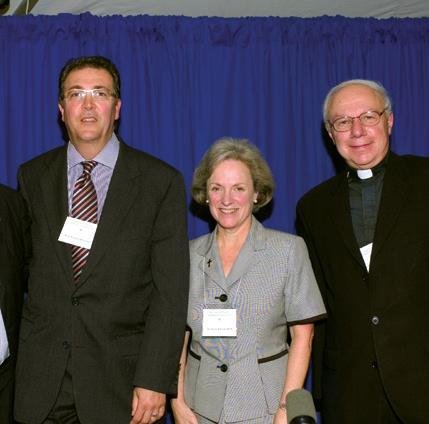
Today, Leadership Roundtable has become the foremost Catholic organization serving senior Church leaders with management expertise in the United States and beyond. The organization responds to emerging trends to create a suite of services that equip institutions to become more accountable and transparent to promote a better, more engaged Catholic experience. Leadership Roundtable has worked in over 75% of U.S. Catholic dioceses.
What began 15 years ago as a courageous conversation between laity and clergy has led to a transformation in the management culture of the U.S. Catholic Church: the recognition that management at its best has always been and should always be about the people it serves and the greater mission of Christ that unites us all.


Leadership Roundtable convened senior clergy and influential lay leaders to discuss how best practices in management and leadership might assist the Church. From these gatherings, participants created 48 recommendations to promote better, missionfocused management.
IMPACT: Leadership Roundtable has turned those recommendations into reality with a suite of services that Church leaders draw upon to improve Church management.
Leadership Roundtable was incorporated as a nonprofit. One of its first services was a DVD and workbook called “The Church in America” that provided Church leaders with an analysis of Catholic trends in order to make strategic plans for the future of parish life.
After Hurricanes Katrina and Rita, Leadership Roundtable partnered with McKinsey & Co. and the Archdiocese of New Orleans to restore the Catholic school system
IMPACT: Because of the partnership, the Catholic schools were able to secure additional funding and serve more students in the aftermath of the devastating storms.
Leadership Roundtable published its first edition of Catholic Standards for Excellence for parishes, dioceses, and nonprofits.
IMPACT: More than 300 Catholic parishes, dioceses, and nonprofits have become Partners in Excellence that actively use the standards.
Leadership Roundtable partnered with Seton Hall University to create the first Toolbox for Pastoral Management.
IMPACT: More than 500 priests and lay people have been prepared with the skills to effectively lead and manage their faith communities.
Leadership Roundtable developed Catholic Leadership 360 that provides Church leaders with a ministryfocused evaluation and leadership growth tool.

IMPACT: Hundreds of lay leaders, deacons, priests, and bishops have participated in this program, enhancing their leadership in the local community.
Leadership Roundtable inaugurated its Best Practices Award to lift up dioceses and organizations that are examples of good management.
IMPACT: The work of 19 individuals or organizations have been given national prominence to inspire other Catholic entities to adopt best practices in management.
Leadership Roundtable hosted a national gathering at which former U.K. Prime Minister, Tony Blair, provided an inspiring keynote. Additionally, Bishop Gerald Kicanas offered 10 suggestions to strengthen communication within the Church.


Recognizing that good leadership training should start early, Leadership Roundtable partnered with the Saint Thomas More Catholic Chapel and Center at Yale to begin ESTEEM (Engaging Students to Enliven the Ecclesial Mission) to equip the next generation of leaders in parishes.

IMPACT: Over the last 7 years, the program has trained 700 young adults to serve in a leadership role in their local Church community after graduation.
Also in 2009, Cardinal Francis George, President of the U.S. Conference of Catholic Bishops at the time, hosted a national meeting of bishops and representatives from Leadership Roundtable to respond to the economic crisis.
IMPACT: Bishops have access to best-in-class economic data and expertise that assists them in responding to significant financial challenges.
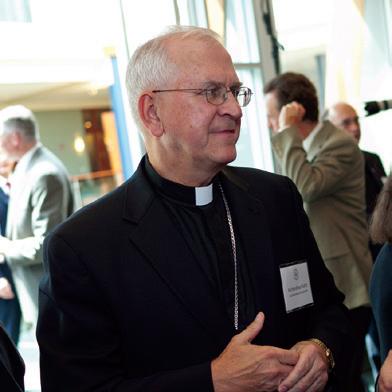
Leadership Roundtable created an online resource called ChurchEpedia and later CatholicPastors.org, a community of practice specifically for Catholic pastors. These initiatives paved the way for Leadership Roundtable to become a clearinghouse for best practices.
Leadership Roundtable began providing coaching to bishops and senior diocesan leadership after a presentation at a Leadership Roundtable conference in which Larry Bossidy, former CEO of Allied Signal/ Honeywell teamed up as an executive coach with Bishop John Barres.
IMPACT: Since then, Leadership Roundtable has arranged and delivered coaching for dozens of bishops and senior diocesan staff.
Leadership Roundtable hosted the first Bishops’ Workshop at the Mid-Atlantic Congress in Baltimore. It is the only event of its kind for bishops and their seniorlevel diocesan staff to learn and share best practices and innovative solutions in pastoral management. Today, the Bishops’ Workshop is also held at the Santa Clara Faith Formation Conference in California.
Leadership Roundtable convened a meeting at Georgetown University to respond to the bishops’ concerns about the cost of Catholic schools and the impact on parishes. From that meeting 20 actionable recommendations were offered to Church leaders as a path forward.
Leadership Roundtable has always emphasized that the mission of mercy of the Catholic Church needs to be at the forefront in the use of best pastoral and strategic business and managerial practices that are ethical, ecclesial, practical, user-friendly, and capable of being implemented.
Leadership Roundtable co-hosted the “National Symposium on Hispanic Leadership and Philanthropy for a 21st Century Church” with Foundations and Donors Interested in Catholic Activities (FADICA), the Mexican American Catholic College (MACC) and the University of the Incarnate Word.
IMPACT: The symposium resulted in a robust set of recommendations and action steps for the local and national Church to better serve and develop Hispanic Catholic leaders.

To support struggling Catholic schools, Leadership Roundtable worked with partners to incubate the Drexel Fund, a venture philanthropy fund that invests and collaborates in the growth of high-quality, financially sustainable networks of faith-based and other private schools.
Leadership Roundtable staff trained faculty for the new international Program of Church Management at the Pontifical University of the Holy Cross (Santa Croce) in Rome.
In order to reach even more pastoral leaders, Leadership Roundtable issued its first book in 2013 with Liturgical Press, A Pastor’s Toolbox, Vol. 1. The Catholic Press Association awarded the book first place in the Pastoral Ministry category. The second, A Pastor’s Toolbox, Vol. 2 was published in 2017.



Jesus’ ministry happened in relationship. Whether he was talking with the disciples in a boat or sitting with the woman at the well, the powerful impact that he had arose out of the relationships he built through conversations. At Leadership Roundtable, we believe the best Catholic ministry still happens in relationship. That is why our Mission Management Model always starts with a conversation, whether we get a call from a bishop struggling with diocesan finances or a diocesan leader who wants to improve his/her pastoral planning efforts. Since our founding, we’ve been dedicated to learning what Catholic leaders need and forming the solutions together.
Our Mission Management Model is built on years of experience that show us that small steps are the building blocks for transformative change. We start with a conversation that leads to a comprehensive assessment of where the parish, diocese, or community currently stands along the Model. We then work with Catholic leaders to create a customized roadmap to help them move towards excellence in mission management for the benefit of the people being served.
The Mission Management Model is a system-wide approach for Catholic dioceses and other Catholic institutions to achieve management and leadership excellence in service of their mission. Its six-stages provide an assessment and customized plan that draws upon Leadership Roundtable’s suite of services in order to assist Catholic leaders in creating a vibrant Catholic experience for the people they serve.
Our services are now part of the
MISSION MANAGEMENT MODEL ...The journey begins when diocesan leaders recognize the need for change. They may encounter resistance that limits effective action. There may be inconsistency between how diocesan leaders want to handle temporal management - such as accounting practices, parish fundraising, or communications - and how it is actually done. There may be growing awareness that the way parishes and dioceses are being managed is hurting the overall mission of the local Church.
EXAMPLE: An Archbishop and Chief Operating Officer from an archdiocese in the South recognized the need to better align resources and provide ongoing formation for diocesan leaders and pastors. Archdiocesan leadership began conversations with Leadership Roundtable and reviewed proposals, but has yet to coalesce around a coordinated approach.
Diocesan leaders clearly state the desired outcomes for management and leadership practices in the diocese and parishes and develop a comprehensive roadmap for progress. The plan includes a clearly articulated vision, benchmarks for progress, specific strategies, action steps, timelines, and accountability.

EXAMPLE: The Synod Implementation Team of an archdiocese in the North pulled together disparate leadership development programs for seminarians, clergy, parish staff, and diocesan staff into a cohesive plan. In partnership with Leadership Roundtable, the archdiocese has clear metrics to evaluate progress toward the goal of building sustainable pastoral leadership capacity.
Diocesan leaders begin to take steps to address the dissonance between current practice and desired practice. It may include false starts and a variety of uncoordinated attempts at solutions. There is action, but without the four key elements of effective change management: 1) a clear plan that is understood by all involved, 2) structures, 3) skills, and 4) models to carry it out.
EXAMPLE: A Vicar for Ongoing Formation from a very large Western diocese recognized some major challenges with parish finances and pastoral planning across the diocese. Leadership Roundtable provided training to introduce best practices in a number of challenging parish situations as a first step toward putting in place a systemic approach to diocesan and parish planning.
During 2017, Leadership Roundtable worked with 45 dioceses who are at various stages within the Mission Management Model. The inspiring stories on these pages reflect how dioceses progress through the six stages to fully integrate best practices into their ministries.
Leaders at various levels of the diocese implement the roadmap with coordinated effort: timelines are met, metrics applied, and resources allocated. There is ongoing oversight and a systematic means for evaluating impact on a regular basis.
EXAMPLE: After articulating a clear vision and developing a detailed plan, an archbishop and chancellor of an archdiocese in a Mid-Atlantic state implemented a series of diocesan-wide processes involving every parish and all personnel. Leadership Roundtable provided key leadership development and coaching resources.
At this stage, a diocese has met its goal to systemically embed best practices from diocesan offices to parishes to its extensive ministries. It is time to plan for the future of the diocese on a foundation of managerial excellence and a flourishing mission.
By this stage, best practices is an intrinsic value to the bishop and a critical mass of other diocesan and parish leaders. This value is clearly articulated and is embedded in expectations of all employees. The diocese has reached a turning point in its systems, policies, and procedures, and has allocated sufficient financial and human resources to ensure sustainability of best practices.

EXAMPLE: A project that began with a retired priest and a religious sister, in the Archdiocese of Indianapolis has grown over three years into a systemic cultural change in how parishes and diocesan offices are managed and led. In partnership with Leadership Roundtable, the archdiocese’ focus is now on rigorous evaluation and plans for sustainability.
... that provides Catholic institutions with a ROADMAP FOR INTEGRATING BEST PRACTICES into their mission.
The following suite of services is available and can be customized for a Catholic diocese, parish, seminary, religious community, nonprofit, etc. They are part of the Mission Management Model.
This assessment compares the functioning of a diocesan office with the highest-functioning comparable offices in the country, in terms of structure, use of resources (people, finances, and facilities), and organizational culture. The process has two phases: interviews of diocesan office staff during a site visit and two simple surveys of leading pastors and all diocesan staff prior to the site visit. Based on outcomes, customized recommendations are offered for moving forward.
IN 2017, Leadership Roundtable completed comprehensive assessments for six dioceses across the country, helping them get a picture of their current state of management and in what areas they might grow.
Catholic Standards for Excellence is a set of 69 best
Church management practices to support Catholic dioceses, parishes, and organizations. These Standards form the foundation of Leadership Roundtable’s suite of services and offer the Church consistent benchmarks for its managerial excellence. Leadership Roundtable offers a two-day seminar in which facilitators gain an array of tools, training materials, resources, and techniques to implement the Standards in their diverse communities. Dioceses, parishes, religious communities, and ministry organizations run according to the Standards can work towards a Seal of Excellence accreditation.
IN 2017, Leadership Roundtable partnered with the Archdiocese of Indianapolis to train pastoral leaders in the implementation of Catholic Standards for Excellence in parishes. Additionally, the Standards were updated to keep them relevant to current pastoral contexts and a new edition was published this year.
Leadership Roundtable designed a comprehensive planning process called “Roadmapping” in response to Church leaders’ reports that they and their congregations were “tired of seeing our plans go nowhere.” The process involves identifying an objective, dividing it into manageable segments, organizing priorities, establishing action steps in a coherent sequence, and assigning accountability measures and timelines for moving forward. The roadmapping process is an integral part of the Mission Management Model.
IN 2017, Leadership Roundtable created 16 roadmaps for dioceses and national Catholic organizations, providing a clear path forward for excellence in Church management.
Leadership Roundtable partners with dioceses, educational institutions, and religious communities to offer a weeklong intensive formational experience for seminarians, clergy, and lay ecclesial ministers on the topic of management of parishes and other pastoral organizations. The curriculum, based on research into the experiences of veteran pastoral leaders, is taught by practitioners who know not only their content area (finance, human resources, management, planning, etc.), but also the dynamics of the Catholic Church.
IN 2017, Leadership Roundtable trained 132 pastoral leaders in the Toolbox for Pastoral Management. They are now equipped to manage their parishes with best practices and create vibrant faith communities.
This custom assessment, developed specifically for lay and ordained leaders in the Catholic Church, offers unique opportunities for growth in leadership, using respectful, structured feedback from those with whom priests and lay leaders interact regularly. Participants identify a wide range of people in their communities who can assess their leadership from a 360-degree perspective.
Each participant receives a report of the assessment results, engages in a confidential feedback session with a facilitator, and creates an individual leadership development plan. The vast majority of participants report that this is a supportive and uplifting process that helps them to grow in their leadership.
IN 2017, Leadership Roundtable worked with 115 lay and ordained leaders as part of Catholic Leadership 360. These participants now posses a comprehensive evaluation and an action plan for how they can grow as leaders to support their parishes and dioceses.
Leadership Roundtable provides consulting services in the areas of management and leadership to individual Church leaders or leadership teams. Consultation can be subject-specific, related to a specific leadership role, or arranged on an ongoing basis as part of a broader organizational development initiative. Characterized by a faithful appreciation of the Catholic Church, a focus on implementation, and deep professional experience, it includes ongoing development of managerial competencies, and often involves coaching senior leaders through specific situations.
IN 2017, Leadership Roundtable worked on multiple consulting engagements for senior Church leaders and dioceses throughout the year.
Leadership Roundtable Coaching is modeled on the best executive coaching techniques and created specifically for Catholic leaders. It is a natural next step for those who have completed the Catholic Leadership 360 program or for those who want to deepen their leadership development. Individuals or groups are teamed up with an experienced coach who offers accountability, support, guidance, and resources.
IN 2017, Leadership Roundtable was honored to support 7 U.S. Bishops with executive-level coaching.
A joint project of Leadership Roundtable and the Saint Thomas More Chapel and Center at Yale University, ESTEEM is a year-long program on college and university campuses that develops the capacity of students to take leadership roles in their parishes and other Catholic institutions after graduation.
IN 2017, Leadership Roundtable surveyed our ESTEEM graduates and discovered that 88% of alumni attend Catholic Mass weekly or more and 90% would recommend the program to a current undergraduate student.
The consulting services and programs offered by Leadership Roundtable have been enormously helpful to the Diocese of Manchester in our efforts to form and develop effective, passionate, and mission-driven diocesan, parish, and school leaders…
 –Diane Quinlan Chancellor, Diocese of Manchester
Photo credit: Georgia Bulletin
Photo by Michael Alexander
–Diane Quinlan Chancellor, Diocese of Manchester
Photo credit: Georgia Bulletin
Photo by Michael Alexander
As part of Leadership Roundtable’s partnership with Bishop Richard Stika of the Diocese of Knoxville, Tennessee, we had a conversation about how we could best support local parishes. As a result, four parishes were selected to participate in Leadership Roundtable’s Catholic Standards for Excellence that equips parish pastors and staff to learn and implement best practices in management. It is one of multiple services available for pastoral leaders in the Mission Management Model.
Fr. Peter Iorio of St. Mary Parish in Johnson City, TN, was one of the pastors whose parish went forward with the program. “I was motivated [to participate] by the fact that I was a new pastor,” Fr. Iorio said. “I believed this would help us become better stewards of the resources God had given us, and achieve a more shared sense of our mission.”
The Catholic Standards for Excellence include practical tools and detailed performance benchmarks that describe how the best managed and most responsibly governed parishes operate. For example, tools aid pastors in the formation and operation of pastoral and finance councils
where lay people bring their expertise and service. These councils, when managed well, help the entire parish community with planning, reduce the burden on the pastor, and promote an engaged, vibrant parish community.
Once St. Mary’s agreed to participate, Leadership Roundtable introduced the benchmarks and tools to its leadership team, and then provided educational resources, training and consultation to help the parish meet the performance indicators outlined. “Now, we have all of our advisory bodies working together to enact our mission,” said Fr. Iorio. “We are very accountable and transparent to the parish.... We have built trust among each other and mutual love.”
Many parishes and dioceses use Leadership Roundtable’s Catholic Standards for Excellence and have the opportunity to become fully accredited as St. Mary’s did. Leadership Roundtable asked Fr. Iorio what advice he would give other parishes and organizations striving for the accreditation. “It is worth the effort to work towards a valuable goal like this, and grace is at work even in the difficulties along the way,” he said. “Do not give up!”
Fr. Peter Iorio (right) stands alongside Bishop Stika (left) who holds the email announcing that St. Mary Parish received its Standard for Excellence accreditation. Photo credit: The East Tennessee Catholic
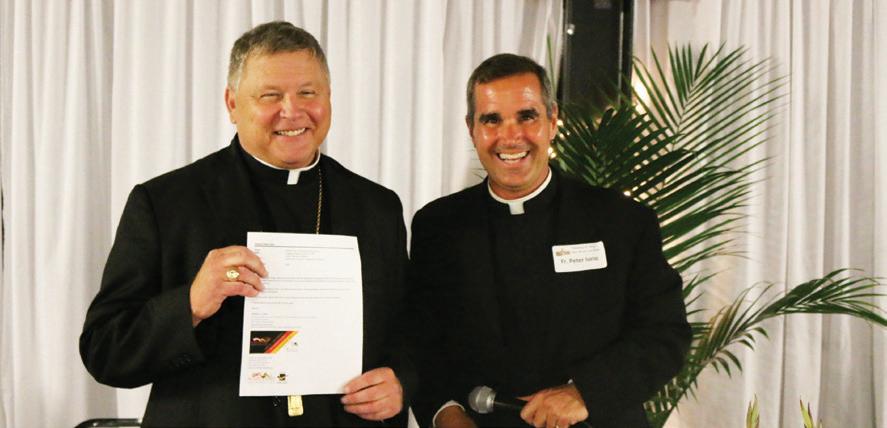
Mission Management Model in Action: How a conversation in the Diocese of Knoxville led to a brave decision and parish transformation
U.S. Church
Global Church: Both at home and abroad there has been encouragement for Leadership Roundtable’s commitment to assist and inspire Church leaders internationally to embrace contemporary best managerial practices, utilize the expertise of laity, and promote accountability and transparency.
Pope Francis boldly recognized the need for Catholic leaders - both lay and ordained - to develop competencies in pastoral management. Recognized as a global leader in Church management, Leadership Roundtable was invited to be a key partner in designing the program and training the multi-national faculty in May of 2017. The program launched in 2018 at the Pontifical University of the Holy Cross (Santa Croce) in Rome. Leadership Roundtable’s Catholic Standards for Excellence are being used as a key component of the program.


Throughout 2017, Leadership Roundtable met with a significant number of Vatican and international leaders to further dialogue on managerial reform. Leadership Roundtable staff traveled to England, Spain, Germany, South Africa, Canada, and Italy to advance relationships with Church leaders. These included Cardinal Turkson, Cardinal Farrell, Cardinal Ravasi, Archbishop Pierre, Papal Nuncio to the U.S., and Archbishop Auza, permanent observer to the UN for the Holy See, along with leaders of international women’s and men’s religious communities and directors of global Catholic apostolates.
...that positively affect the missions of both the LOCAL AND GLOBAL CHURCH
Jim LundholmEades, Leadership Roundtable’s Director of Programs and Services, presents to faculty in Rome. Photo credit: Pontifical University of the Holy CrossLeadership Roundtable continues to lift up and advance a national conversation about mission management in support of the Church through regular convenings, keynotes, interviews, and publications.
The Bishops’ Workshop is the preeminent occasion for Catholic bishops and senior level staff to gather together to share and learn best practices in management and leadership with one another. Leadership Roundtable has hosted the Bishops’ Workshop at the Mid-Atlantic Congress in the Archdiocese of Baltimore for the last six years.
Each year, the workshop is created in conjunction with the bishops who select topics ranging from finances to human resources to change management. In 2017, bishops and senior leaders from eight dioceses attended the workshop. As part of the larger conference,
Leadership Roundtable staff and faculty also present sessions for pastoral leaders serving in parishes and schools.
In 2017, Leadership Roundtable hosted our first Bishops’ Workshop on the West Coast at the Santa Clara Faith

Formation Conference in the Diocese of San Jose. In its inaugural year, six bishops and 58 senior level diocesan staff attended the event.
In 2017, staff and board members spoke at conferences including the American Academy of Religion (AAR), National Association of Catholic Pastoral Administrators (NACPA), Association of Catholic Advancement and Admissions Professionals, Lilly Endowment’s Economic Challenges Initiative, and the National Organization for the Continuing Education of Roman Catholic Clergy (NOCERCC) to name a few. Staff were featured in media ranging from America magazine and the Boston Globe to Crux and the Catholic Channel on Sirius Radio. Additionally, our Global Ambassador, Kerry Robinson, spoke at Rome’s Stampa Estera where she addressed managerial reform and leadership engagement in the Church.
Intent on serving the Church with innovative solutions for managerial challenges, Leadership Roundtable has held annual gatherings that bring together some of the foremost Catholic thinkers and practitioners to dialogue and promote the Church’s interests in pastoral management. Bishops, senior lay and ordained leaders, along with Catholic professionals in academia, business, and philanthropy met for the Annual Leadership Convening, June 29-30, 2017, in Orlando, FL.
–Fr. John Hurley, CSP, Vicar for Evangelization, Diocese of San Jose who are the great managers....
Responding to Pope Francis’ apostolic exhortation, The Joy of the Gospel, Leadership Roundtable focused this year’s theme on “Engaging, Equipping, and Energizing Catholic Leaders for the Joy of the Gospel.” The event served as a pre-conference to the United States Conference of Catholic Bishops’ (USCCB) unprecedented gathering of 3,500 of the country’s bishops and Church leaders.
Bishop Frank Caggiano inspired attendees with his keynote that identified essential characteristics of ecclesial leadership, including: “A clear vision regarding one’s ministry, a commitment to make plans that are not just words, but action-oriented, a sense of coresponsibility because we are in this together!”
Louisville and the Archdiocese of Milwaukee for their exemplary focus on supporting their pastoral leaders with leadership development tools.
Archbishop Jerome Listecki of Milwaukee spoke of the importance of collaboration in leadership: “We have to be a Church that understands its relationship to all who are part of it. As we will continue to increase vocations in the priesthood and the deaconate, we need more and more competent ministerial leaders. We need more and more individuals who are the great managers who are able to assist us, and sometimes to free the priest to be able to do the sacramental work so that we, as a Church, can continue, survive, and thrive.”
As part of the gathering, Leadership Roundtable’s Best Practices Award was bestowed upon the Archdiocese of We inspire the Church to transform its MANAGEMENT CULTURE to ensure excellence in mission.
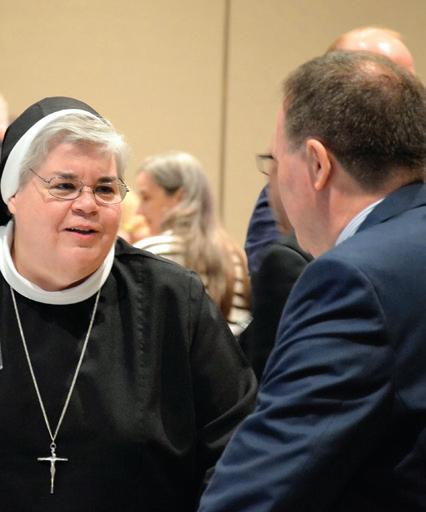
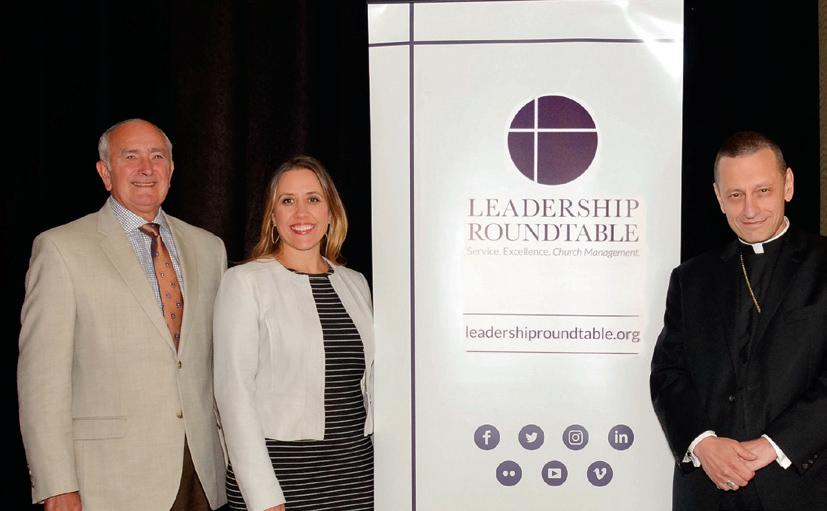 -Archbishop Jerome Listecki
-Archbishop Jerome Listecki
My experience with Leadership Roundtable over these many years enabled a powerful partnership to develop in my various ministries....
Bryan F. Grane began his career with William Blair & Co. as an investment banker where he worked as a Mergers and Acquisition analyst. Later, he joined Central States (CST) in a Sales and Operating role. He purchased Central States in 2006 and as Chief Executive Officer, CST became one of the premier intermodal logistics companies in the United States. The company was sold to Forward Air Corporation (FWRD) in February 2014 for an industry record valuation.
He earned his Bachelor of Business Administration in Finance and Business Economics from the University of Notre Dame
and his Master of Business Administration at the Kellogg School, Northwestern University. He is also an eight-year member of YPO (Young Presidents’ Organization).
Mr. Grane has always held a strong love for the Catholic faith and is quick to give credit to his faith for his many blessings. Bryan was blessed to marry his high school sweetheart, Stephanie, on the Feast Day of St. Rita of Cascia. They have three children and, together, founded the St. Rita Mercy Foundation with the specific intent to help support organizations that are focused upon promoting the Catholic works of mercy.

Secretary for Higher Education, Society of Jesus & Center for Global Jesuit Education, Fordham University
Fr. Michael Garanzini, SJ served as the 23rd president of Loyola University Chicago (2001 - 2015), seeing the institution through a challenging financial period to its now thriving and innovative reputation in Catholic higher education. After his presidency, he was appointed by the Superior General of the Society of Jesus to serve as the Secretary for Higher Education globally.
A seasoned university administrator, tenured professor, author, and scholar, Fr. Garanzini has spent the majority of his career
working in higher education including at Georgetown, Fordham, Saint Louis, and Rockhurst universities, as well as Gregorian University in Rome. Fr. Garanzini received his BA in psychology from Saint Louis University and his doctorate in psychology and religion from the University of California, Berkeley and the Graduate Theological Union. He has a long history of supporting best practices in Catholic institutions, serving on many boards and moving organizations through change management.
I’ve been familiar with the work of Leadership Roundtable since its inception... From what I know happening in Rome, these fundamental ideals and principles are now a part of Pope Francis’ agenda calling for greater transparency and competence in the management of Church affairs. Leadership Roundtable’s agenda has achieved real traction.
–Fr. Michael Garanzini, SJContributions
YEAR
INDIVIDUALS 868,261 841,910
FOUNDATIONS 995,980 331,612
OTHER ORGANIZATIONS 14,602 52,590
Total public support 1,878,843 1,226,112
PROGRAM SERVICE REVENUE 505,718 476,265
PUBLICATION SALES 2,751 3,819
INVESTMENT REVENUE 6,702 -354
Total revenue 515,171 479,730
TOTAL PUBLIC SUPPORT AND REVENUE 2,394,014 1,705,842
FISCAL YEAR PERCENT OF
PROGRAM PARTNERSHIP GRANTS 424,500 0
YEAR
OF
PROGRAM SERVICES 1,339,182 1,058,099
Total program services 1,763,682 75% 1,058,099 64%
MANAGEMENT & GENERAL 243,816 10% 288,518 18%
FUNDRAISING EXPENSES 355,392 15% 297,361 18%
Total supporting services 599,208 25% 585,879 36%
TOTAL EXPENSES 2,362,890 100% 1,643,978 100%
Change in net assets 31,124 61,864
Net assets at beginning of year 796,472 734,608 Net assets at end of year 827,596 796,472
Leadership Roundtable has total assets of $827.6 thousand that consist of: Unrestricted Assets 444,762 Temporarily Restricted 382,834 Total Net Assets 827,596
Unrestricted net assets are used to account for public support that is unrestricted in nature. Temporarily restricted net assets are used to account for contributions that have donor-imposed restrictions that have not been fulfilled either in or by purpose.
This summary was prepared by Leadership Roundtable from its financial statements, which were prepared by Matthews, Carter & Boyce. The complete financial statements, including the related notes and auditor’s report, are available upon request.
Anonymous
Archdiocese of Atlanta
Archdiocese of Indianapolis
Bertelsen Family Fund
The Boisi Family Foundation
Carnegie Corporation of New York
Catholic Health Initiatives
Cushman Foundation
Diocese of Duluth
Diocese of Pittsburgh
Diocese of Saint Augustine
Edward L. Hennessy, Jr. and Ruth S. Hennessy Foundation, Inc.
Elizabeth & Frank Ingrassia Foundation
Geschke Family Foundation
Hammarskjold Family Fund
The Healey Family Foundation
Hidden Pond Foundation
Indianapolis Center for Congregations, Inc.
Lilly Endowment Inc.
Montrone Family Charitable Lead Annuity Trust Mutual of America
Penates Foundation
Pontifical College Josephinum
Raskob Foundation for Catholic Activities, Inc.
St. Catherine Laboure Parish
William E. Simon Foundation, Inc.
Richard A. Abdoo
Steven Barry
Rev. Robert L. Beloin Robert L. Berner
Donald F. Boehm Maureen I. Bolduc
Timothy Brennan Michael and Stephanie Brough Elizabeth J. Brown Kevin K. Carton
Brendan J. Cassin Michele M. Cogan Megan E. Colford Helen C. Cooney
Carl DeBarbrie Daniel J. Denihan Peter Denio
Frans Dokman
Elizabeth A. Donnelly Kevin G. Donovan
Lt. Gen. James M. Dubik, USA (Ret.) and Sharon Basso Cynthia Egan
James and Deb Estes James P. Ferry Joseph F. Finn, Jr. John J. Fontana Zenobia V. Fox Rick G. Francis Anne M. Gavin Joan Gecik Bryan Grane William C. Graustein Archbishop Wilton D. Gregory
Bishop Gregory J. Hartmayer Alice B. Hayes Dr. Margaret M. Healy Rev. J. Bryan Hehir
Brian J. Hughes Rev. John E. Hurley, C.S.P. Louis Iasiello
Rev. Peter J. Iorio Dr. Martha R. Jewell Victoria R. Kennedy Mary Kessler Susan Robinson King Joseph T. Kolarik Thomas Krause Stephanie Lane R. Wayne Lechase Carlos Lima James Link Kevin E. Lofton Dennis and Pam Lucey Robert and Dorothy MacDonald Lawson Magruder Elizabeth McCaul Dr. Kathleen L. McChesney Patrick A. McClain Richard C. McGinnis Anne W. McNulty Kevin B. Meme
Hon. Michael Montelongo David Mount Robert C. Myers Thomas Norton
Dr. George O’Connell Sue Orlando Elio Pascutti
Rev. Shaji J. Pazhukkathara Peter A. Persuitti Jim Perry
James E. Post
Rev. Thomas Ptaszynski Rev. Stephen Rapposelli
Gen. Dennis Reimer, USA (Ret.) Rev. Michael G. Roach
Kerry A. Robinson and Michael Capello, M.D. Ann and Peter Robinson Darla Romfo
Rev. David Ryan Dr. Terrence Ryan Dr. R. Gregory Sachs Rev. Timothy Shapiro Stephen Sledesky Susan M. Smith
Dr. Kimberley A. Smolik Nicole Sotelo
Dr. and Mrs. Peter Steinfels Dominic and Leona Tarantino Mark Teresi
Rev. Donald Thimm Rev. Wilbur Thomas Paul and Joanne Tierney Fay Vincent Patrick J. Waide Rev. John J. Wall Christina Wallin Brian Walsh Donald and Susan Watters
Archbishop Thomas G. Wenski John A. Werwaiss Rev. Robert Wolfee Bishop David A. Zubik
Leadership Roundtable is focused on bringing the talents of Catholics to design and deliver training in management, finance, communications and human resources to the leadership of our Church. This sharing of talent is a calling to serve that is greatly needed. It’s an honor to help this organization to deliver the fruits of those talents more widely to the Church.

–Elizabeth McCaul, Board Member Chief Executive Officer of Promontory Europe Promontory Financial Group, an IBM Company
FEBRUARY 1, 2019 | WASHINGTON, DC
Leadership Roundtable is pleased to announce the Catholic Partnership Summit, a gathering of leading clergy, religious, and laity. This event will create a space for Church leaders to address the most pressing Church management challenges and opportunities of our times. We will host a day of inspiring conversations, innovative ideas, and high-level networking to further Catholic management excellence in service of mission.
Archbishop Christophe Pierre, Papal Nuncio
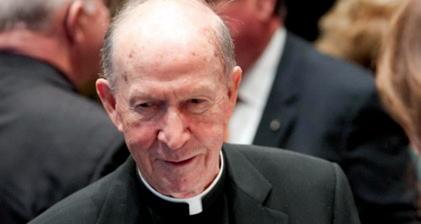
Cardinal Seán O’Malley, Archdiocese of Boston
Cardinal Joseph Tobin, Archdiocese of Newark
Cardinal Donald Wuerl, Archdiocese of Washington
Archbishop Joseph Kurtz, Archdiocese of Louisville
Archbishop Jerome Listecki, Archdiocese of Milwaukee
Bishop Patrick McGrath, Diocese of San Jose
The Catholic Partnership Summit culminates with the presentation of the Monan Medal of Catholic Philanthropy. Celebrating the late president and chancellor of Boston College, the Monan Medal of Catholic Philanthropy is Leadership Roundtable’s highest honor. It recognizes those who have a track record of philanthropic support of Catholic activities that reflect the ideals and breadth of Fr. Monan’s legacy toward excellence in management and leadership.
Fr. J. Donald Monan, SJ